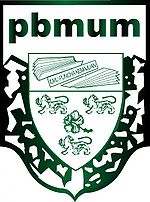- PBMUM
-
University of Malaya Malay Language Society
Persatuan Bahasa Melayu Universiti Malaya
Leader Muhammad Jailani Abu Talib Founded January 29, 1955 Headquarters Universiti Malaya, Kuala Lumpur, Malaysia Ideology Malay language,
Intellectualism,
Justice
Islamist,Official colors Green, White, Black Persatuan Bahasa Melayu Universiti Malaya (Malay for University of Malaya Malay Language Society) (abbreviated PBMUM) is a Malay language, literature and culture oriented student body that has played an active role in the development of the modern Malay language in Malaysia and Singapore.
Contents
History
PBMUM was established as Persekutuan Bahasa Melayu in Singapore on 29 January 1955 with twenty seven members.The formulation of PBMUM was made a success with the support of lecturers and undergraduates of the faculty of literature. These individuals include Lukman Musa, Noh Abdullah, Tahir Abdul Rahman and Fatimah Hasyim. However, the main idea of forming such a body came from Royal Professor Ungku Abdul Aziz and Pendeta Za'ba who were firm in the ideas of forming a Malay student body that would play a role in the development of Malay literature and language. With much support from individuals and undergraduates in the university, PBMUM's membership steadily rose from 202 in 1956 to 721 in 1965. At the end of academic session 1970/1971, PBMUM's membership rose to a strength of 3123 undergrates, thus making its mark as one of the most influential bodies in the history of language development in Malaysia.
In 1959, following the set up of two autonomous divisions in 1959 with one campus being in Singapore and the other in Kuala Lumpur, PBM's operation shifted its focus to Malaysia. Subsequently, the name was later officially changed to Persatuan Bahasa Melayu Universiti Malaya (PBMUM) in 1969.
Mission statement
PBMUM is committed towards the development of the Malay culture and language as can be observed in the society's mission statement (1969)[1] :
1. Develop the Malay language and promote its use
2. Contribute effectively towards the development of Malay literature.
3. Develop the arts and culture of the Malay society.
4. Promote and conduct research in the field of Malay culture and art.
5. To be well-informed of the ongoings of the Malay language and work hard towards an effective contribution.
Contributions
The core of PBMUM's principle in 1954 was to persuade the Malayan government to recognise the Malay language as its national language.[2] Recognising PBMUM's voice and struggle, the Majlis Undangan Persekutuan Tanah Melayu (Malayan Council) agreed on 31 May 1955 to take the Malay language as Malaya's national language. In 1969 however, PBMUM restructured its policy to also undertake the issue of using the Malay language as Malaysia's language medium of education and included the need to play a role in the development of the nation.[3] PBMUM believes that it represents the voice of the people. PBMUM stands strongly against racism and upholds the view that its primary principle is in the development of the nation. Of this, Kochiko Mazilo believes that PBMUM's approach was not based on emotions and radicalism alone but acts as a platform that supports the government's aspiration. The use of the Malay language as well as the educational policy that it upheld stands true as the beliefs and want of the public.
Notable Leaders
PBMUM is also notably led by various individuals who later turn out to play an important role in the development of the nation. Among the notable figures who has led PBMUM includes revered figures in the academic, social and political circle such as Tan Sri Professor Emeritus Awang Had Salleh, Dato' Dr. Nordin Selat, Dato' Nordin Abd. Razak, Dr. Mohd. Fuad Zarkashi, Dato' Saifuddin Abdullah, Associate Professor Dr. Nuwairi Haji Khaza'ai (Academician) , Dato' Seri Anwar Ibrahim (Former Malaysian Deputy Prime Minister) and Datuk Ahmad Shaberry Cheek (Malaysian Youth and Sports Minister).
Leadership
1955/1956 - Datuk Lukman Musa
1958/1959 - Syed Husin Ali
1960/1961 - Dato' Mohd. Yusof Hitam
1961/1962 - Datuk Hassan Ahmad
1963/1964 - Tan Sri Professor Emeritus Awang Had Salleh
1964/1965 - Mohd Noorani Kamarur
1965/1966 - Dato' Dr. Nordin Selat
1966/1967 - Ismail Daud
1967/1968 - Dr. Sanusi Osman
1968/1969 - Harun Awal
1969/1970 - Dato' Seri Anwar Ibrahim
1970/1971 - Dato' Nordin Abdul Razak
1971/1972 - Mahathir Mohd. Khir
1972/1973 - Zulkifli Hj. Ahmad
1973/1974 - Ab. Aziz Shamsudin
1979/1980 - Associate Professor Dr. Nuwairi Haji Khaza'ai
1980/1981 - Dr. Mohd. Fuad Zarkashi
1981/1982 - Hashim Pajian
1983/1984 - Dato' Saifuddin Abdullah
1984/1985 - Dato' Saifuddin Abdullah
1984/1985 - Wan Ahmad Ibrahim
1985/1986 - Fauzi Mat Nor
1988/1989 - Masnil Shahrir
1989/1990 - Rohaizad Ahmad Fatanah
1990/1991 - Abdul Rahman
1991/1992 - Fazli Hisahak
1992/1993 - Ahmad Fakhruddin Hussain
1993/1994 - Ahmad Nazari Sulaiman
1994/1995 - Abdul Ghaffar Yahya
1995/1996 - Md. Arfizal Md. Ariffin
1996/1997 - Jamarussalam
1997/1998 - S. Ramlee Shamsuddin
1998/1999 - S. Ramlee Shamsuddin
1999/2000 - Mohd Nizam Shaari
2000/2001 - Mohd Yusrin Mohamed Yusof
2001/2002 - Wan Azlee Wan Abdullah
2002/2003 - Khazali Mohd. Din
2003/2004 - Othman Yunus
2005/2006 - Zulkifli Bin Mohamad
2006/2007 - Hilmy Rizal
2007/2008 - Arif Atan
2008/2009 - Wan Mohamad Wasif bin Wan Mohamad
2009/2010 - Muhammad Jailani Abu Talib
2010/2011 - Muhammad Jailani Abu Talib
Reference
- ^ Mohd, Fazil (1969). PBMUM 69/70. Persekutuan Bahasa Melayu Universiti Malaya, University of Malaya.
- ^ Abdul Rahman, Haji Abdullah (1997). Pemikiran Islam di Malaysia : Sejarah dan Aliran. Jakarta : Gema Insani Press. ISBN 9789795614302.
- ^ Nordin, Razak (1973). PBMUM - Perubahan Sikap Pelajar-pelajar Melayu. Department of Malay Studies, University of Malaya.
Categories:
Wikimedia Foundation. 2010.
